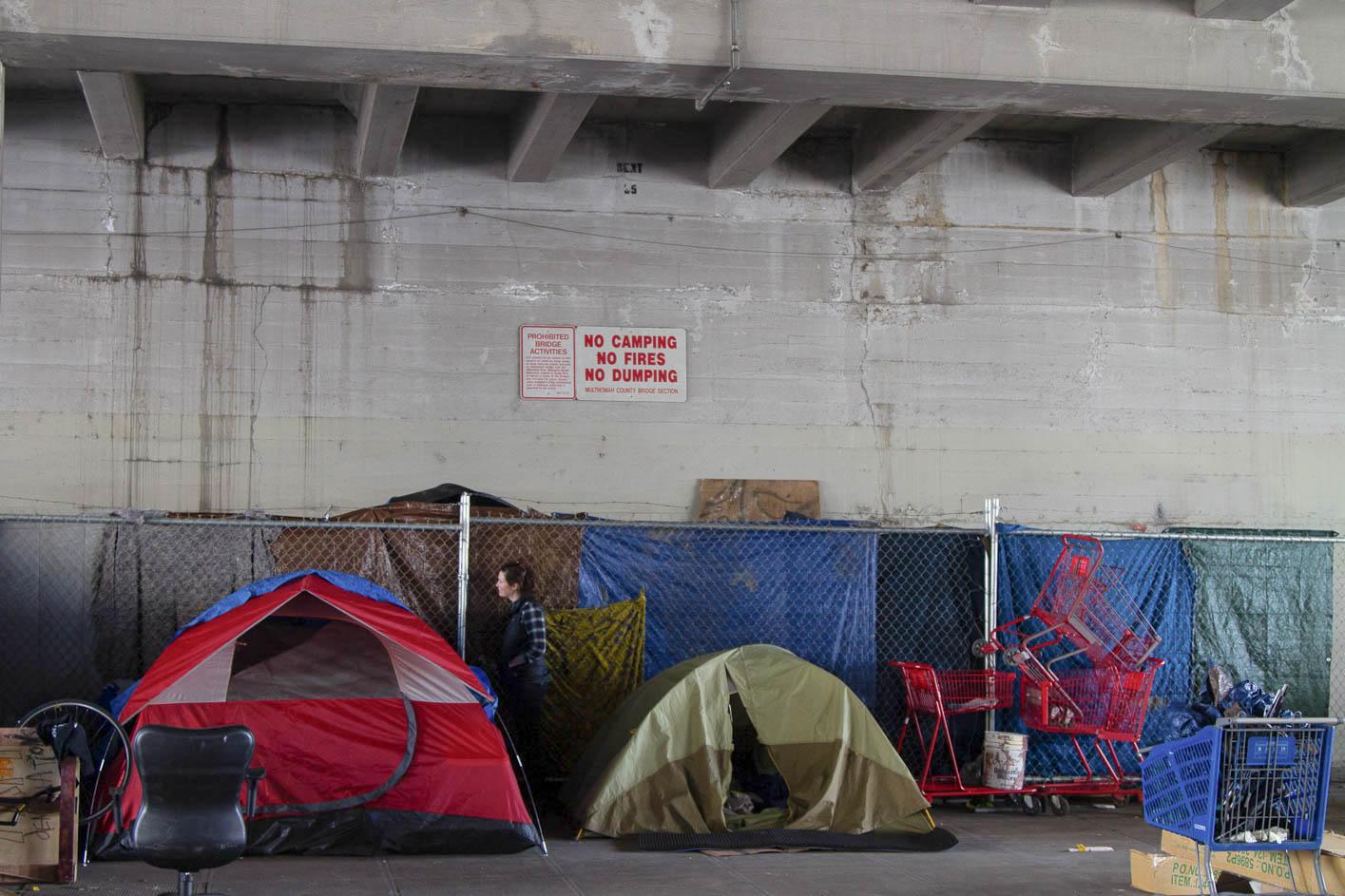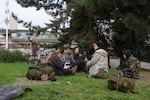
Outreach worker Liz Weber tries to start a conversation. Tent camping isn't allowed on sidewalks, but the city has been lenient in enforcing the rules.
Amelia Templeton / OPB
On a recent morning, Liz Weber starts her search for people sleeping outside. She's on the front lines of Portland's effort to end homelessness — and Mayor Charlie Hales' decision to allow some public camping.
Weber, outreach worker with the aid group JOIN, spots a group of unfamiliar people.
“So you just got into town?" she asks.
The group is lying in the grass on a narrow triangle next to Interstate 84. A girl pulls on a pair of jeans and introduces herself as Serenity Raie. She is 19 years old.
“I was in San Fran', right before here, and then before then I was in Toledo, Ohio. And now we’re going to Denver, apparently, and then Canada," Raie says.
A white rat sleeps in her pocket. It’s a pet. Raie says she’s been a homeless traveler her entire life. Her parents sent her out on her own when she turned 14.
“I grew up in the back of a hippie bus," she tells Weber. "My parents were travelers. They were just like, 'You’re old enough to go do this by yourself.'”
Raie has only been in town for four days, but she knows that camping on some city property is legal now: “Which is really cool," she says, "because last time I was here, the cops were waking you up. You know, foot in your face if you’re not up."

Homeless traveler Serenity Raie says she's been on the road since she turned 14. She appreciates Portland's Safe Sleep policy.
Amelia Templeton / OPB
A man with his hair in dreadlocks sticks his head out of his sleeping bag.
He says his name is Marte. He’s been here for a month or so, and he hasn’t heard about the new policy called Safe Sleep. Weber takes a stack of cards out of her pocket and hands him one. The cards list the new rules for camping.
He reads them out loud: “'Any tents can only be up from 9 p.m. to 7 a.m.' What?” He curses.
"It’s hard to get all your stuff up by 7," Weber says.
"Do you wake up every morning by 7?" he asks.
“I do," she says, "but I don’t have to pack up my house.”
Back at her car, Weber says that was a pretty typical conversation.
“I don’t know very many people who are packing up their tents," she says. "I think it’s very difficult for the people sleeping outside to comply with that part.”
And so far, the city isn’t forcing people to comply. Weber says in the part of North Portland she walks, she isn’t aware of any police enforcement of the rules. In every part of town, seemingly permanent tent camps are forming.
“We’re going to be tolerating some level of street homelessness, whether it’s in a doorway or a camp, until such time as we have enough shelter beds,” the mayor says.
Hales says the city is asking homeless people to comply with the rules voluntarily. Police are doing very little enforcement. They step in only if a camp becomes a problem or if neighbors complain.
“We’re not going to have enough police officers to deal with every situation every morning," he says.
But some neighborhoods are fed up with the tent cities, and don’t feel like the police are responding to their complaints.

Outreach worker Liz Weber talks with a group of homeless travelers camped near Interstate 84 in Portland.
Amelia Templeton / OPB
Last week, a coalition of neighborhood and businesses groups sued the city over the safe sleep policy.
“The city of Portland has a number of ordinances regulating sleeping on sidewalks, pitching tents on city property and fire safety," said Paul Conable, a lawyer representing the plaintiffs. "None of those are consistent with the mayor’s current policy.”
The groups are asking a judge to issue an injunction and to force the mayor to withdraw the safe sleep policy.
Weber says she sees the mayor’s new policy as step in the right direction for a city in crisis. She thinks the camps haven’t grown that much. They’re just more out in the open than they used to be.
“Taking some of the fear out of camping is perhaps a shift in tone that I think is helpful," she says.
Weber says her job as an outreach worker isn’t handing out cards of rules to homeless people. It’s helping them find a permanent home. And the real problem, she says, is that she can’t find any affordable places for people to move into.
